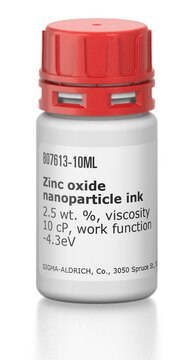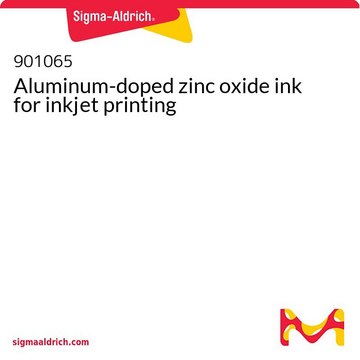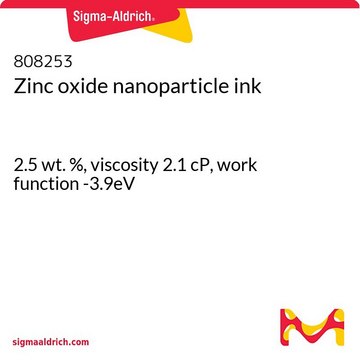808237
Aluminum-doped zinc oxide nanoparticle ink
2.5 wt. %, viscosity 2.2 cP, work function -3.9 eV
Synonym(s):
AZO ink, Al-doped ZnO dispersion, Al-dopend ZnO suspension, Al:ZnO ink, Avantama N-21X, Nanograde N-21X
About This Item
Recommended Products
Quality Level
form
dispersion
concentration
2.5 wt. % (crystalline Al doped ZnO (3.15 mol% Al) in mixture of alcohols)
work function
-3.7--4.1 eV
particle size
8-16 nm
viscosity
1.7-2.7 cP
Looking for similar products? Visit Product Comparison Guide
Application
Preparation Note
- Storage: In dark at room temperature.
- Prior to application: Shake, ultrasonicate with sonic horn and (optionally) filter through 0.45μm PTFE filter.
- Post-treatment: Annealing of deposited Al doped ZnO films at 80°C - 120°C.
Legal Information
Signal Word
Danger
Hazard Statements
Precautionary Statements
Hazard Classifications
Aquatic Chronic 2 - Eye Irrit. 2 - Flam. Liq. 2 - STOT SE 3
Target Organs
Central nervous system
Storage Class Code
3 - Flammable liquids
WGK
WGK 2
Flash Point(F)
60.8 °F
Flash Point(C)
16 °C
Choose from one of the most recent versions:
Already Own This Product?
Find documentation for the products that you have recently purchased in the Document Library.
Articles
Professor Tokito and Professor Takeda share their new materials, device architecture design principles, and performance optimization protocols for printed and solution-processed, low-cost, highly flexible, organic electronic devices.
Recent progress in the area of solution-processed functional materials has led to the development of a variety of thin-film optoelectronic devices with significant promise in the industrial and consumer electronics fields.
Our team of scientists has experience in all areas of research including Life Science, Material Science, Chemical Synthesis, Chromatography, Analytical and many others.
Contact Technical Service




![Dichlorotetrakis[3,5-difluoro-2-(2-pyridinyl)phenyl]diiridium(III) 95%](/deepweb/assets/sigmaaldrich/product/structures/300/702/f03c66ed-f8fa-4103-a508-e57483592685/640/f03c66ed-f8fa-4103-a508-e57483592685.png)





